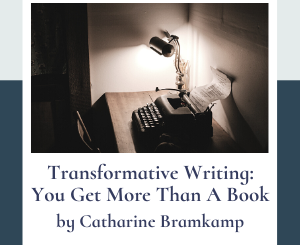What is Transformative Journaling and Why is it Different from Regular Journaling? by Catharine Bramkamp
 Let’s welcome back monthly columnist Catharine Bramkamp as she shares with us “What is Transformative Journaling and Why is it Different from Regular Journaling?” Enjoy!
Let’s welcome back monthly columnist Catharine Bramkamp as she shares with us “What is Transformative Journaling and Why is it Different from Regular Journaling?” Enjoy!
***
You’ve heard all about journaling. You recognize Julia Cameron’s name. You’ve heard of morning pages as well as Natalie Goldberg’s now ubiquitous ten-minute write.
Both of which are based on automatic writing – the idea of writing straight from your subconscious, circumventing the conscious, editorial section of your brain can uncover and express greater truths and insights.
Truth and insights are exactly what you are going for in your journal, but it’s not necessarily ready for the greater reading public.
Contrary to Popular Myth
Even though Jack Kerouac (under the influence of both Alan Ginsberg and Gary Snyder, oh, and alcohol) wrote On The Road more or less spontaneously, he heavily edited before publication.
Contrast that effort against Gertrude Stein who believed every word that poured from her conscious was publication worthy.
Who are we still reading? Yeah.
Write your truth, be spontaneous but don’t think it is ready to drop into your blog. It’s not. And that is more than okay.
Journaling can be a wonderful self improvement program that is easier than exercise and more fun than crosswords.
Journaling
If you’ve been journaling forever, switch up your writing from just griping and complaining to exploring how you can make the situation better or how you can think about your situation differently. If this is all new, you may benefit from bitching a bit, and working through issues.
The transformative part comes when you start expressing what you want to happen. This is the key. There is benefit to bitching, there are more benefits to moving your brain and your consciousness to a more positive place.
Since thoughts create our reality, it makes sense that the more often you think and interpret the world in one way, the world will increasingly appear to you in that same way. Think sad thoughts all day, and pretty soon you’ll cry every time you see a daisy.
Fortunately it’s not about willpower or just “change your mind” or “flip the switch.” It’s about writing.
If you want to stop crying in flower gardens, you can change how you see them.
How to do it?
Fortunately it’s not about willpower or just “change your mind” or “flip the switch.” It’s about writing.
Rise in the morning and set a time limit to your writing. Drink a hot beverage and scrawl whatever pops into your head. As you write, consider what you are writing. Is it all bad? All unicorns and rainbows? Great. Write those unicorns out of your system.
Now look at what you wrote. Let’s say you wrote how frustrating the holidays are. You list who you hate, who you resent, what happened last year. What you despised about last year. How you cry when you pass the cranberry sauce. The cranberry sauce is never the right kind. Just saying.
All great stuff.
“… changing your story can change your life. And transformative journaling is one of the best ways to do it.”
Transformation
Now transform those gripes and bitches into a positive action plan. Crazy right?
Under that brand-new raw section of what you hate about the holidays, now write: “What I really want to feel… What I really want to happen… What I really want to do…”
Maybe it’s take a trip instead of giving gifts. Maybe it’s not seeing a certain relative. Describe the perfect holiday.
Now spend a few minutes fantasizing about how to make that perfect holiday happen. What would it take? What would you do? Could you offer to bring the cranberries?
Just by writing down what you really want, what would be lovely to experience, and what would make you happy, you change your focus.
Writing actually trains your subconscious, so that after a few weeks, instead of recording what sucks, you’ll will find you record a better solution. Trite, I know, but it actually works. But only if you want your life to improve.
I like to say that changing your story can change your life. And transformative journaling is one of the best ways to do it.
Want to learn more?
Then check out this home study/self-paced course, “How Telling Your Story Today Can Change Your Tomorrow,” an 8-week class Teachable.com course now.
I’ll also be running a live 8-week interactive class via email starting January or February 2019. Contact me to sign up for that.
***
ABOUT THE AUTHOR
When she’s not pulling her mother out of traffic, Catharine coaches and teaches fiction, non-fiction, and journal writing.
 Catharine Bramkamp is an author and writing coach — visit her at www.Catharine-Bramkamp.com. She has written 17 novels and 3 books on writing. Her poetry appears in over a dozen anthologies including And The Beats Go On (she was editor, as well) and the chapbook Ammonia Sunrise (Finishing Line Press). Her current book, Don’t Write Like We Talk, is based on her co-producer experience creating 200-plus episodes of the Newbie Writers Podcast. She is the Chief Storytelling Officer for technical companies because everyone has a story.
Catharine Bramkamp is an author and writing coach — visit her at www.Catharine-Bramkamp.com. She has written 17 novels and 3 books on writing. Her poetry appears in over a dozen anthologies including And The Beats Go On (she was editor, as well) and the chapbook Ammonia Sunrise (Finishing Line Press). Her current book, Don’t Write Like We Talk, is based on her co-producer experience creating 200-plus episodes of the Newbie Writers Podcast. She is the Chief Storytelling Officer for technical companies because everyone has a story.






